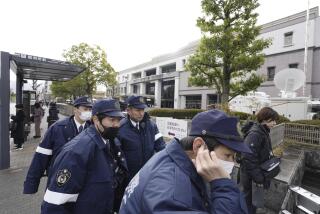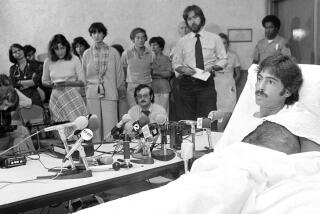Japanese Cultist Sentenced to Die for Nerve-Gas Attack
- Share via
TOKYO — A member of a Japanese doomsday cult was sentenced to death today for his role in releasing nerve gas that killed 12 people on the Tokyo subways in 1995.
Masato Yokoyama, 35, received the first death sentence in connection with the incident, which also left thousands ill.
The judgment came just a day after Aum Supreme Truth said it would close its branches, stop recruiting and cease using its current name.
Media reports had suggested that the cult would admit responsibility for the nerve gas attack and apologize, but it did not.
Yokoyama’s lawyers had said he was unaware of sarin’s lethal potential and argued that, because nobody died on the train where he spread it, he should get a lighter sentence.
But prosecutors said it was merely coincidence that nobody died in that particular train car and that Yokoyama shared responsibility for the fate of victims who died elsewhere.
A doctor belonging to the cult, Ikuo Hayashi, who was one of five people accused of spreading sarin on the subway trains, is serving a life sentence.
Yokoyama is also accused of playing a leading role in the cult’s illegal production of guns.
In a news conference Wednesday, cult representative Tatsuko Muraoka said the sect had decided to temporarily suspend most of its activities because of strong public opposition and a police crackdown that had forced it to close branch offices.
The cult’s leaders said the group will temporarily stop using the name Aum, as of Friday, because it had created too much friction with the public and hurt the group’s image.
The 2,100-member cult’s basic beliefs remain unchanged, and believers will continue to practice the religion, Aum spokesman Hiroshi Araki said.
Cult leader Shoko Asahara, facing a total of 17 charges, told the court last week that plans for the subway gassing had been discussed by cult members but that he was “asleep” during the discussions.
More to Read
Sign up for Essential California
The most important California stories and recommendations in your inbox every morning.
You may occasionally receive promotional content from the Los Angeles Times.










